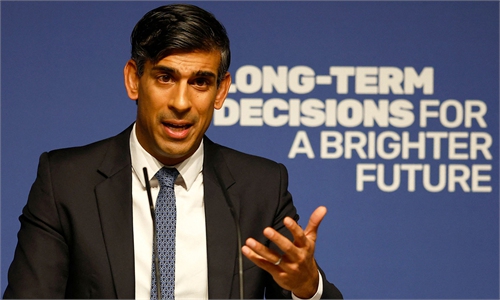Do not interpret China's participation in global AI safety summit narrowly: Global Times editorial

Photo:VCG
The first global AI safety summit ambitiously organized by the UK is set to take place on November 1 and 2. Right from the inception of the event's planning in the UK, there was a question of whether China would be invited and whether China would attend. According to latest UK media reports, Wu Zhaohui, vice minister of science and technology, along with representatives from the Chinese Ministry of Foreign Affairs, tech companies, and academic institutions, have been invited to attend. They will engage in discussions with peers from around the world on issues related to the secure development of AI technology in pursuit of international consensus.
The participation of Chinese representatives has sparked a lot of discussions in the international media and has been given additional significance. Some people view it as "another sign of the thaw in China-UK relations," and the POLITICO Europe has stated that if the UK brings China and the US together, it will be a major diplomatic coup. These interpretations are all from a perspective of international relations or geopolitics, and frankly speaking, they are somewhat narrow and limited. Although AI is primarily a technological topic, the global AI safety summit hosted by the UK has never been devoid of the influence of domestic politics, geopolitics, values and ideologies all along. These factors will be obstacles and constraints on the achievement of results at this conference in the future.
Since it's called as a "global AI safety summit," excluding China, which boasts the world's largest AI application market, would be ironic. The UK is just a step away from this. The voices of opposition against inviting China have been quite loud among some British politicians. Even after the UK government decided to extend the invitation, there were still some vehement "dissenting voices" within the UK, with former prime minister Liz Truss even writing a letter requesting incumbent Prime Minister Rishi Sunak to rescind the invitation. This forced Sunak to provide an explanation and emphasize that inviting China is "the right thing to do." The resistance faced by the UK in making the right decision has been a common theme in recent years among Western countries.
In contrast, China considers the inherent complexity and necessity of things when making decisions. China's decision to send representatives to the summit is rooted in the belief that it is necessary, without allowing some narrow-minded attitudes within the UK to deter its participation. This demonstrates China's openness and its responsible approach to the well-being of all humanity.
AI is a new field of human development. Everyone can see the tremendous opportunities brought about by the rapid development of global AI technology, as well as the unpredictable risks and complex challenges. This is a common issue that concerns the fate of all mankind and the countries of the world. However, global AI governance lags far behind the speed of technological development. The world urgently needs to reach a basic consensus on this issue in order to equip rapidly developing AI technology with a global unified standard steering wheel and brakes, so that it can better serve the well-being of all mankind, rather than becoming a new tool of hegemony for some major countries or even facilitating large-scale new types of crimes. Therefore, the world needs more comprehensive discussions. The UK hosting this global AI safety summit provides an opportunity for such discussions, regardless of any subjective calculations. China has supported the UK's move with practical actions.
It is worth mentioning that the three major global powers, China, the US and Europe, have recently made efforts in the global AI governance. On October 18, President Xi Jinping proposed the "Global AI Governance Initiative" in his keynote speech at the opening ceremony of the Third Belt and Road Forum for International Cooperation, systematically outlining China's proposals on AI governance from three aspects, namely, the development, security and governance. On October 30, US President Biden signed an executive order on AI, which was called the "most significant action any government anywhere in the world has ever taken on AI safety, security and trust." Prior to this, President Biden's top science advisor praised the UK's invitation to China to participate in the AI summit as a "terrific idea." The long-awaited Artificial Intelligence Act of the European Union has also entered the final negotiation stage.
If China, the US and the EU can reach some consensus on global AI governance, it would be of great significance. One key aspect, as mentioned in China's "Global AI Governance Initiative," is to oppose drawing ideological lines or forming exclusive groups to obstruct other countries from developing AI, as well as to oppose creating barriers and disrupting the global AI supply chain through technological monopolies and unilateral coercive measures. Whether this healthy and constructive mindset can be maintained not only affects the specific outcomes of this summit, but also the safe development of AI.



